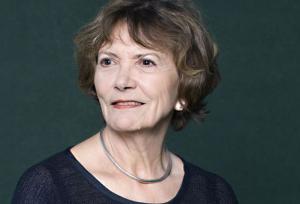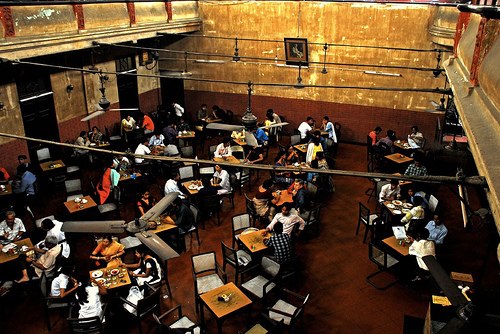November 2008
Monthly Archive
November 22, 2008
Posted by Dave under
change,
Coffee
1 Comment
In terms of coffee I’ve made a big change this year. Last year I was out of the country and so experienced a substantial period of withdrawal from Monmouth Coffee. http://www.monmouthcoffee.co.uk/ourcoffees.htm
So determined never to be strung out again I took up home roasting!
I have been a keen drinker of coffee for years and a devotee of Monmouth Coffee, arguably the best coffee in London. However it hadn’t occurred to me that it was possible to roast my own until a work colleague of Jacqueline’s, Ljiliana, mentioned that she used to roast her own coffee, just put the green beans in a pan and put them in the oven – simple as that.
Apparently according to Kenneth David’s: ‘Home Roasting Romance and Revival
roasting your coffee at home was common in Mediterranean countries right up until the 1950’s. Read a review http://coffeegeek.com/reviews/accessories/coffee_books/binki/969
The staff at Monmouth were fantastic! Helpful, enthusiastic with advice and support, and I now have a small home roaster and within 20 minutes or so and no fuss I have fresh roasted coffee.
I love the changes associated with coffee; the green grassy smelling beans transformed from this  to this….
to this…. 
roasting liberates the taste and aroma.
Here’s a great pictorial guide to the changes that take place in roasting coffee. http://www.sweetmarias.com/roasting-VisualGuideV2.html
Why roast your own?
If you like coffee – why not have as fresh as possible? Roasted beans are best within a day or two maybe a month at best. Green beans stay in good shape for a year or two so you can build up a coffee cellar of beans from different countries, a variety for whatever taste.
It’s maybe a bit cheaper (even taking into account the purchase of a roaster, mine cost £112), green beans and roasting costs against buying good quality roasted beans from a speciality roaster. I now buy small quantities of green beans online from Stephen Leighton at Hasbean http://www.hasbean.com/ who sources beans from speciality coffee growers around the world.
But heck mostly it’s fun! A chance to explore the diverse tastes of coffees from around the world and experiment with different roasts; even my small machine allows you to vary temperature & time to suit your own roast profile.
I like to drink coffee mainly by filter (or drip brew as it’s also known). I know most people seem to be obsessed with espressos, flat whites, square blacks and god knows what else but here’s Monmouth’s advice on how to make a good cup of filter:-
http://www.videojug.com/film/how-to-make-filter-coffee
Of course another change attributed to coffee is the physical change that results from drinking the stuff….the caffeine! Apparently contrary to the belief that coffee is in itself a stimulant and gets you wired, the caffeine actually inhibits the brain’s release of adenosine which calms us down and makes us drowsy. Coffee stops the brain naturally slowing us down.
But really above all Coffee is all about company and conversation and the changes arising from interacting with fellow human beings… the interview with Amber Fox in Erin’s excellent series of interviews sums this up eloquently:- “Enjoy the coffee for who you’re with……… just enjoy it!
http://meetthepresspot.wordpress.com/page/2/
November 13, 2008
Posted by Dave under
Age,
change
1 Comment

Photo: GERAINT LEWIS
Earlier this week I started asking co-conspirators to speculate as to “what would bring about significant changes in the way we think about older age?”
Shortly after that my attention was drawn to the announcement that the Minister for Women Harriet Harman had appointed Dame Joan Bakewell as the Governments official Voice of Older People. Joan will act as an independent and informed advocate on issues affecting older people’s lives. http://www.independent.co.uk/news/uk/politics/the-bakewell-manifesto-we-need-more-loos-1006609.html
I’ve been ruminating over this turn of events. Whilst I guess any raising of the profile of older people in a society obsessed with “yoof” should be a good thing and according to Gordon Lishman, Age Concern Director General, “Joan Bakewell offers a formidable set of skills, proven commitment and real passion” I remain uneasy for several reasons.
1. Why just a “voice” rather than a kick-ass Commissioner? Why play celebrity gestures?
How come we now have an official “voice” for older people but not a Commissioner? In March 2005 the Government saw fit to appoint Professor Al Aynsley-Green as England’s first Children’s Commissioner. http://www.everychildmatters.gov.uk/strategy/childrenscommissioner/
Earlier this year Wales’ First Minister, Rhodri Morgan, appointed Ruth Marks MBE as the first Commissioner for Older People in Wales. http://new.wales.gov.uk/topics/olderpeople/commissioner/?lang=en
The First Minister and Deputy First Minister for Northern Ireland announced in December 2007 their intention to create a Northern Ireland Commissioner for Older People.
Why not England?
2. None of the issues mentioned (so far) are older person specific?
The Press highlight a few things bugging Dame Bakewell such as the need for better access, more lifts, better designed packaging and more public toilets. All very well and nobody would disagree, however all these things are not the province of just older people – we would all benefit from them – especially any of us with any mobility challenges, parents with small children and after all this is not special design for older people , it’s simply good design.
It’s shame that the Design Council did not continue the Red “Do-Tank” set up in 2004 to tackle social and economic issues through design led innovation. http://www.designcouncil.info/mt/RED/ageing/
By the way Joan 2008 is the International Year of Sanitation and
19TH NOVEMBER IS WORLD TOILET DAY

3. Will a chat show approach (however articulate and formidable) make any difference? Why not direct action?
If we are to believe that the baby boomers won’t be pensioned off (The New Old: Demos) http://www.demos.co.uk/publications/thenewold and can’t wait for the chattering classes to get the Government’s act together why not a call for direct action on these issues Joan?
Why not a mass pensioner piss-in at the House of Commons?
You can count on me Joan. I’ll happily volunteer spending a penny or giving it free to the floor of the House!
But this leads me to think that Joan’s appointment, however well intentioned, won’t bring about “significant changes in the way we think about older age?”
What would?
November 10, 2008
In The Devil’s Cup Stewart Lee Allen quotes historian F.H. Haines, “Coffee houses like Lloyds provided a place where ideas were developed as they would never have been in the private guildhalls and brain muddled tap rooms.” While most of continental Europe still believed coffee dried up one’s brain cells, London was the cafe capital of the world. This was about 1680. Read a review of The Devil’s Cup by “flimbag” at http://www.toomuchcoffee.com/index.php?module=Pagesetter&func=viewpub&tid=3&pid=89
Over copious cups of coffee in coffee houses recently I’ve been posing friends and colleagues (my co-conspirators) the question “what would bring about significant changes in the the way we think about older age?” To kick things off here’s my first conspiracy thought.

Photo by Lecercle - Here under the high whirling ceiling fans and in the environs of these fading mildew covered brown walls sit tragic young writers, Marxists, philosophers, students, economists and now IT workers with puff-pastry egos; the air was thick with philosophical rantings as dense as the number on their glasses . More than any other coffeehouse, perhaps, the Kolkata's Coffee House exemplified the the Antelle attitude, a monument to the glory of Calcutta and its uplifting elixir, caffeine and the rich conversation it spewed.
We need to change radically the way public services engage and work with older people. This is because the growing population of older people is creating powerful economic, social and political pressures and services are too often out of step with the aspirations and expectations of today’s – let alone tomorrow’s – older citizens.
• By 2030 nearly half the population of Western Europe will be over 50 and life expectancy at age of 50 will be into the nineties. http://www.idea.gov.uk/idk/aio/5821192
Government and most Local Authorities and Public Services still focus almost exclusively on the 15% of older people who use intensive health and social care services, at the expense of the remaining 85%. As a result older age is seen predominantly through the narrow lenses of health and social care delivery.
We would begin to view later life, the lives of older people radically differently if the lead for this were not in Adult Social Care. What if we simply had People departments rather than separate Children’s Services and Adult Social Care? Rather than reserving talk of vision for our children’s future and doling out palliatives for the problems of older people (or just the 15%). Let’s think, talk and plan for communities for all ages!
November 7, 2008
Posted by Dave under
change | Tags:
change |
1 Comment

If nothing ever changed, there'd be no butterflies. ~Author Unknown
Recently as I was about to set up my new venture as a Coach (www.davemartin.org.uk ) I needed an accountant. I was explaining to him what coaching was about – people seeking something to be different, some kind of change in their lives.
“In my experience people rarely change”, was his rather dismissive retort.
Hmmnn well then according to him I’m fxxxed!
Actually in my (admittedly relatively limited) experience people may not change but they do makes changes… sometimes seemingly small changes which snowball… they changes circumstances, their outlook, attitude and feel better about things.
The first step is acknowledging that change is possible….and that they’re willing to take the action to bring it about.
The following is an extract from an interview by Rebelgirl on Newsvine with Barry Zweibel, a Master Certified Coach, specializing in Executive Coaching and Life Coaching http://rebelgirl.newsvine.com/_news/2008/09/19/1885905-interview-with-barry-zweibel-of-gotta-getta-coach-inc-
“Rebelgirl: What do you find is the biggest struggle for people like me, who are seeking to make their life better, but unsure on where to start?
Barry: The BIG THREE limiters are:
(1) One’s own negative self-talk
(2) One’s family, friends, and colleagues who may mean well, but still manage to routinely undermine one’s confidence, emotional well-being, and ultimate desire for change
(3) The self-limiting beliefs inherent in, and associated with, items (1) and (2) Because of the BIG THREE, most people never even get to the ‘where to start’ question – it’s as if they’re “tasered” into giving up before they even get started. Very sad. Indeed, if you’re stuck and not sure why, chances are one or more (likely all three) of the BIG THREE are nipping at your heels.”
Finally, after pondering the wise accountants remark, I’m pleased to say I’ve been fortunate to work with people who have indeed grappled with Barry’s big three and have made changes and as a result made their lives better.
“The key to change… is to let go of fear.” Rosanne Cash
November 4, 2008
Posted by Dave under
Uncategorized | Tags:
Age |
Leave a Comment
How old would you be if you didn’t know how old you were? Satchel Paige
A couple of weeks ago we were meeting some friends and as we hadn’t seen their daughters for some time the youngest was desperate to update us on all the important news since we had last met.
“I’ve changed my age!” She announced proudly.
This is the most delightful description of having a birthday I’ve ever heard, the sense of being in control of the onset of time and choosing to change….wonderful!
It got me thinking about our take on age… what fun to have an attitude towards our age and refer to it as how we feel. How often do we hear people lament that they don’t feel old or are surprised by their chronological age…”
“I don’t feel that old…I still feel 25!”
It’s interesting that the French language constructs age as “I have age”, rather than “I am an age”, J’ai vingt–cinq ans (and being French I guess they can do what they like with it – who’s asking?)
Maybe we could declare two ages whenever we’re asked… chronological and how you feel at the time….. How old do you feel today?
Ah, but I was so much older then, I’m younger than that now. Bob Dylan
 to this….
to this…. 



